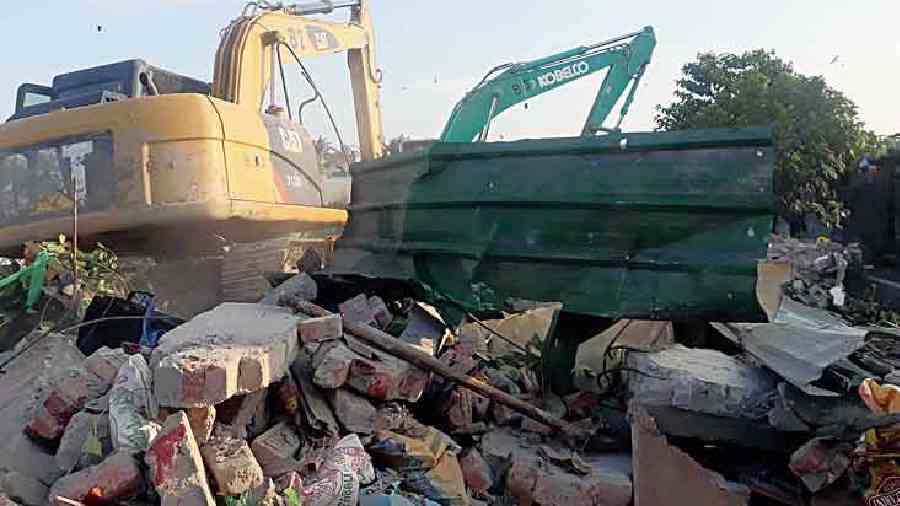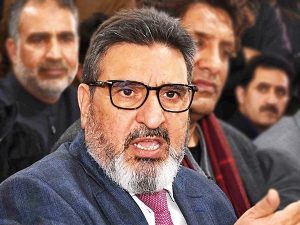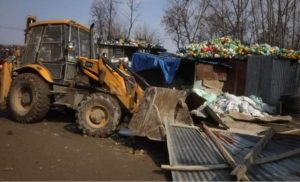
Land eviction drives panic, razes confidence in J&K
Last week, Shuaib Wani, a lawyer and resident of Srinagar’s Barzulla locality, waved a bunch of papers in front of officers outside his four-storeyed shopping complex after it was sealed at Bemina as part of the ongoing land eviction drive in Jammu and Kashmir. The lawyer argued that despite paying ₹42 lakh to the Srinagar Municipal Corporation (SMC) in 2004 through an open auction and building the structure over the years, he has now been told that it stands on government land.
“I don’t understand. Why was my property sealed without any notice on January 4 when I have all valid documents? I got bank loans against these documents and now revenue officers have threatened to demolish the structure,” Wani said exasperated.
He is not alone. Hundreds of families, many of them shop owners, have found their names on the list on social media with a warning of demolition. Though the J&K administration has clarified that it has not issued the list being circulated on social media, it has done little to allay the fears of residents wary of government bulldozers razing their houses and business establishments under the anti-encroachment drive that was launched three weeks ago.
“A fake list of encroachment on nazul property (government land for non-agriculture purposes) in Srinagar district is being circulated on social media. A case is being registered against miscreants spreading panic,” Srinagar deputy commissioner Ajaz Asad said.
Land of masses, for masses
Over the past three weeks, hundreds of kanals of government land have been retrieved and buildings bulldozed under the drive. Court documents show a total of 20,46,436 kanals of state land is under illegal occupation (see box).
J&K lieutenant governor Manoj Sinha has assured the common man that he “won’t be touched”. “Only the state land under powerful and influential people, who have grabbed government property due to their influence, will be retrieved,” he said last week.
J&K chief secretary Arun Kumar Mehta said the encroached state land is being retrieved only for giving it back for public use. “This retrieved land belongs collectively to the masses. It will be used for their benefit. Nobody can usurp the rights of the common man,” he said, pointing out that such measures should be supported by people as the retrieved land will be used for building public utilities, such as hospitals, schools, playgrounds, bus stands, industries and parking spaces.
High and mighty not spared
The eviction drive has raised the hackles of the high and mighty for they have also borne the brunt. Cutting across party lines, properties of former ministers, including Peerzada Mohammad Sayeed, Maqbool Dar, Haseeb Drabu, Taj Mohiudin, and Ali Mohammad Sager besides former legislators Farooq Andrabi, Mir Qasim and Sofi Yusuf, have been retrieved and sealed.
“We had all documents and lived there. Time will prove sealing our property was illegal,” said Yusuf, who belongs to the BJP. He added that he backs the drive to retrieve state land from encroachers.
The boundary walls of properties belonging to former Budgam deputy commissioner Farooq Renzu and a serving superintendent of police were demolished, while advocate Shabnum Lone, the sister of Peoples Conference chairman Sajjad Lone, faced similar action.
Forty kanals were retrieved from the Nedous family in the heart of Srinagar. Nedous are related to National Conference president Farooq Abdullah. The family claimed it possessed the ancestral land for centuries.
Tehsildar Moin Kakroo, who is leading the drive, rebutted allegations of any bias, saying his team did not touch any land with valid papers. “I retrieved 40 kanals that was in illegal possession of the Nedou family,” he said.
Allegations of bias surface
In Jammu, street protests broke out in the Muslim-dominated Sanjuwain and Bhatindi areas as inhabitants claimed their properties are being deliberately targeted.
National Conference vice-president and former chief minister Omar Abdullah besides People’s Conference leader Sajad Lone questioned the demolition drive and alleged bias against the community.
Omar asked the government to stop “harassing” the people of J&K. “We are not supporting land grabbers. But there should be a procedure. The bulldozer shouldn’t be the first option, it should be the last resort.”
Lone blamed the “cabal of tourist officers” for the drive. “They (officials) are not even serving notices. In villages, they come with bulldozers and demolish the property. Do they want to retrieve land or humiliate the people of Kashmir? J&K is a part of India. Has land been retrieved from all parts of the country? Lt Governor Manoj Sinha is from Uttar Pradesh. Has every portion of illegally occupied government land been retrieved in UP?”
Another former chief minister, Mehbooba Mufti of the Peoples Democratic Party, said: “The use of bulldozers has made Kashmir worse than Afghanistan.”
Apni Party president Altaf Bukhari went a step further. “Nobody, whether rich or poor, should be touched. The land in question belongs to the people of J&K and we will regularise this land once a government gets elected,” he said.
BJP state spokesman Altaf Thakur said: “The drive has nothing to do with Hindu or Muslim. Encroachments by BJP leaders, if any, should also be demolished, but illegal colonies should be regularised. Our policy is clear.”
Panic palpable on the ground
The nervousness is palpable on the ground. “We have heard bulldozers have been kept at the police station and will be used to demolish our houses. We have decided to resist any such bid. If our homes are taken away, where we will go?” said Bilal Ahmad, who lives on a three marla plot in interior Dal in Srinagar. “We built a single-storeyed house at Beighmollah in 1996 and are now being threatened with demolition,” he said.
Social activist and District Development Council member from Sangrama, Irfan Hafeez, said the government should have first ascertained the encroachment on a case-to-case basis. Besides categorising the properties, it should have checked the duration of occupation and quantum of encroachment. “People at the helm say marginal ones won’t be touched but there’s no order to protect them. This is a violation of natural justice as many have not been given the opportunity to be heard even if they are in possession of a piece of land for decades, sometimes with the fourth generation in possession. The mental agony due to this action is against the spirit of welfare state and law of adverse possession.”
Militants threaten revenue officials
Sensing an opportunity, The Resistance Front (TRF), an offshoot of Lashkar-e-Taiba, has threatened bulldozer owners, drivers and officials of the revenue department, who are at the forefront of the eviction exercise.
The TRF claimed that the drive is a part of “establishing illegal settlements” in Kashmir. “When the properties of Resistance Lovers were being destroyed, you were watching as mute spectators but Resistance Fighters will fight for your cause for the sake of Allah,” read a TRF statement on social media.
Police said revenue officials were being provided adequate protection.
PIL at the root of eviction drive
On January 20, the Supreme Court refused to stay a circular issued by the J&K government, directing all deputy commissioners to remove encroachments on state land, including the Roshni and Kahcharai property by January 31. Acting on the orders, the DCs issued notices asking people to remove encroachments before January 31 or face demolition.
But the genesis of the drive took root in August 2011 when a public interest litigation (PIL) was filed by SK Bhalla in the Jammu and Kashmir high court about land-grabbers, including politicians, land sharks, bureaucrats and police officers, illegally occupying state land across J&K. Bhalla sought a special investigation team probe. His lawyer, Sheikh Shakeel, said: “The petition did not mention people with small landholdings or shops. Later, advocate Ankur Sharma filed a PIL about Roshni land. Other petitions were clubbed. In 2020, the high court passed a judgment to retrieve the land from these influential people.”
He said the judgment wasn’t against any community, but unfortunately only two areas, Bhatindi and Sunjuwan in Jammu, are singled out, while many influential people were not touched. “So far, land from former deputy chief minister Kavinder Gupta in his native village has been retrieved after my efforts. There politicians, particularly of the BJP, who have occupied prime state land but have not been touched. Neither have we seen action against many former bureaucrats, police, revenue officers and powerful businessmen.”
“If 18 colonies have been regularised in Jammu in the past, why not these two colonies? It is a cause of concern,” Shakeel said. Likewise, Khasra number 781 at Deeli village of Jammu, which is prime land grabbed by the influential, hasn’t touched, he added.
Despite repeated attempts, J&K chief secretary Ashok Mehta and revenue commissioner VK Bidhuri didn’t respond to calls and messages.
ILLEGALLY OCCUPIED GOVT LAND
Total government land under illegal occupation in J&K: 20,46,436 kanals
Anantnag: 33,710 kanals of which 4,324 kanals regularised under Roshni Act
Bandipore: 46,929 kanals of which 11,002 kanals regularised under Roshni Act
Baramulla: 1,14,135 kanals of which 4,200 kanals regularised under Roshni Act
Budgam: 43,742 kanals of which 3,321 regularised under Roshni Act
Ganderbal: 24,544 kanals of which 809 kanals regularised under Roshni Act
Kulgam: 29,114 kanals of which 941 kanals regularised under Roshni Act
Kupwara: 54,034 kanals of which 3,139 regularised under Roshni Act
Pulwama: 40,620 kanals of which 3,311 regularised under Roshni Act
Shopian: 13,180 kanals of which 1,849 regularised under Roshni Act
Srinagar: 44,294 kanals of which 496 regularised under Roshni Act
Doda: 1,77,517 kanals of which 54,212 regularised under Roshni Act
Jammu: 1,60,358 kanals of which 44,915 regularised under Roshni Act
Kathua: 1,04,746 kanals of which 26,292 regularised under Roshni Act
Kishtwar: 75,159 kanals of which 18,185 regularised under Roshni Act
Poonch: 1,29,717 kanals of which 6,597 regularised under Roshni Act
Rajouri: 3,96,018 kanals of which 2,83,444 regularised under Roshni Act
Ramban: 1,67,521 kanals of which 24,993 regularised under Roshni Act
Reasi: 1,41,524 kanals of which13,380 regularised under Roshni Act
Samba: 97,133 kanals of which 8,585 regularised under Roshni Act
Udhampur: 1,52,416 kanals of which 90,607 regularised under Roshni Act.
Source: Court documents

